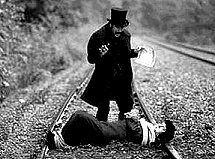After just
finishing the script for my film, I’ve really given a lot of thought into the
relationship between the two main characters, Tom Alpha and Marty McCoy. The
idea was to make a badass buddy cop movie about these two guys who are
essentially Tango and Cash. I focused so much on the fact that they’re
fighters, I forgot to write in a love interest. After giving it some major
thought about the purpose of a love interest, I concluded that it was
unnecessary, and furthermore, a waste of time.
 |
| The Damsel in Distress |
My interpretation
of a woman in this kind of film is this: She can be a wife who worries too much
about her man being out in the field (in this case, the character of Alpha),
but I felt like that sort of character would have no change throughout the
film. Another option would be to make her equal to our heroes, making her just
as badass as them. This I liked, but I’ve noticed that this type of character
shows up in sequels in this particular genre, and since I’m trying to emulate
the genre, than that wouldn’t work either. Lastly, I could write in the basic
female role of: girl meets boy, girl doesn’t like boy, boy woos girl to sleep
with him (making her his only weakness), girl gets captured by villain, boy
confronts villain, kills him, and wins the girl. This would be the only logical
option, but frankly, I hate this formula. It is seen over and over in these
types of movies, and it makes me sick. So, for this film I decided to change it
up a bit.
While
putting together this script, I found an article about homoeroticism in
Hollywood films. There’s a chapter about what it means to make a “buddy film”
and what it means to be “masculine”. When reading, I found a quote made by
Vincent Canby stating that it’s male filmmakers “shattering our egos, making us
uncertain about our identities and persuading us to question something called
‘male-bonding’, which used to be known simply as friendship” (Lang, p.
181). It made me wonder about the
evolution of the genre from the 60’s all the way to now. This genre itself
seems to have undergone a crisis of self-consciousness. I question whether the
main heroes (mostly men) are in a love story with female interests or with each
other. It really made me think about my two protagonists and (maybe) reinvent
their personas.
 |
| Is this sociably appropriate? |
After much
thought, I decided that these two characters are not directly homosexual, but
they’re not completely heterosexual either. I tried to build in a lot of character
development between the two; lots of male bonding. These guys are truly
themselves when they’re just by themselves, and it’s very noticeable in some
scenes. In fact, I purposefully wrote one scene where Alpha gets captured, and
McCoy has to save him. I would have avoided a capture if possible, but I
figured that, in order for the hero to confront the villain for the last time,
he needs to for a reason, with that reason being 99% of the time, saving the
damsel in distress. In this example, we can assume that McCoy sees Alpha as his
damsel in distress. So, basically, I want my audience to decide whether these
guys are secretly in love or not.
Resource:
No comments:
Post a Comment